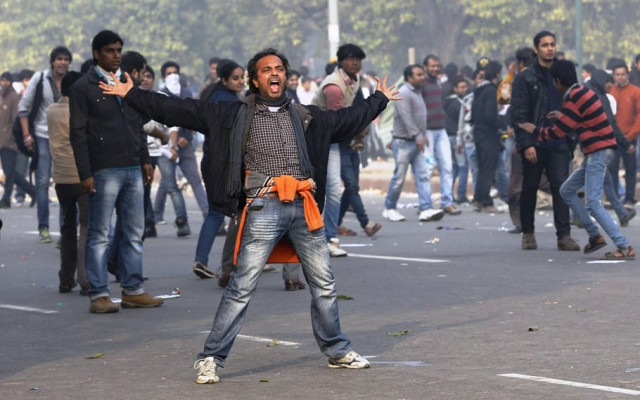Public outrage as a uniting factor
Most outrage expressed in Pakistan over injustice is either false or mischievous measuring brutal nature of society.

A demonstrator shouts slogans during a protest in front of India Gate in New Delhi. PHOTO: REUTERS
A 23-year-old paramedical student who boarded what she thought was a public bus on December 16 was brutally raped and beaten nearly to death by a group of men. Rape has become endemic in India but one must retain balance by keeping in mind that India has a large population and it boasts a liberal social system in which men and women enjoy equal rights with no restrictions applied to women in terms of dress and modesty of conduct. There are over 100,000 rape cases pending and that, too, is understandable because of the tortuous process of the burden of proof against offenders not considered guilty unless proved so.
Public outrage over such apolitical offences is natural but societies express it in measure to their development as a civilisation. In places where civic virtue and civic consciousness is highly developed, reactions are propelled by sympathy regardless of the identity of the victim: the feeling is clearly based on a universal solidarity among human beings. However, where states allow preferences based on identity, public outrage becomes modified by prejudice. If the victim belongs to a community that is marginalised for ideological reasons, he is bound to get a mixed or lukewarm response. In India, some communities, including the Muslims, might feel that they attract less collective sympathy; but the Hindus of Pakistan not only get minimal sympathy, they may be punished for being victims.
In more strictly pluralist societies like in the United States, public outrage is more genuine. The recent incident of a Christian killing Christian schoolchildren and teachers attracted universal outrage and grief. However, US outrage was not politicised; only the possible action against the proliferation of weapons was opposed by certain powerful lobbies now clearly under pressure from public opinion. Clearly, such demonstrations of collective emotion are reflective of the moral underpinning of the cohesion of the state in which people live by consent.
In states where identities are allowed to be separated without assurances of equality under law, public outrage is of a different quality based on discrimination and selective morality. Kidnappings of Hindu girls in Sindh and their forcible subsequent marriages do not attract the sort of universal outrage they should in a democratic state with constitutionally proclaimed equal rights. When a minority is collectively abominated, as the Ahmadis are, each incident of injustice may actually be greeted with mute satisfaction reminiscent of pogroms of the Middle Ages in Europe. As for the sectarian bias now rampant in Pakistan today, the atrocities committed against the inhabitants of Parachinar and Quetta do not move the Sunni majority the same way as the injustice done to Kashmiris and Palestinians.
Most of the outrage expressed in Pakistan over injustice is either false or mischievous measuring the brutal nature of society nurtured by a biased state or on pure hatred ill-concealed under insincere slogans. Absence of genuine outrage is also owed to the environment of fear created by al Qaeda and its Taliban affiliates. The attempt on the life of young Malala produced a shameful backlash against those who felt sympathy for her. More cruelly, the relatives of the victim are supposed to accept the misdiagnosis that it was not the Taliban who killed the victim but America in tandem with India and Israel. The lack of genuine moral outrage in Pakistan actually signals the decline of the capacity of the state to survive as a consensual entity.
Published in The Express Tribune, December 25th, 2012.















COMMENTS
Comments are moderated and generally will be posted if they are on-topic and not abusive.
For more information, please see our Comments FAQ